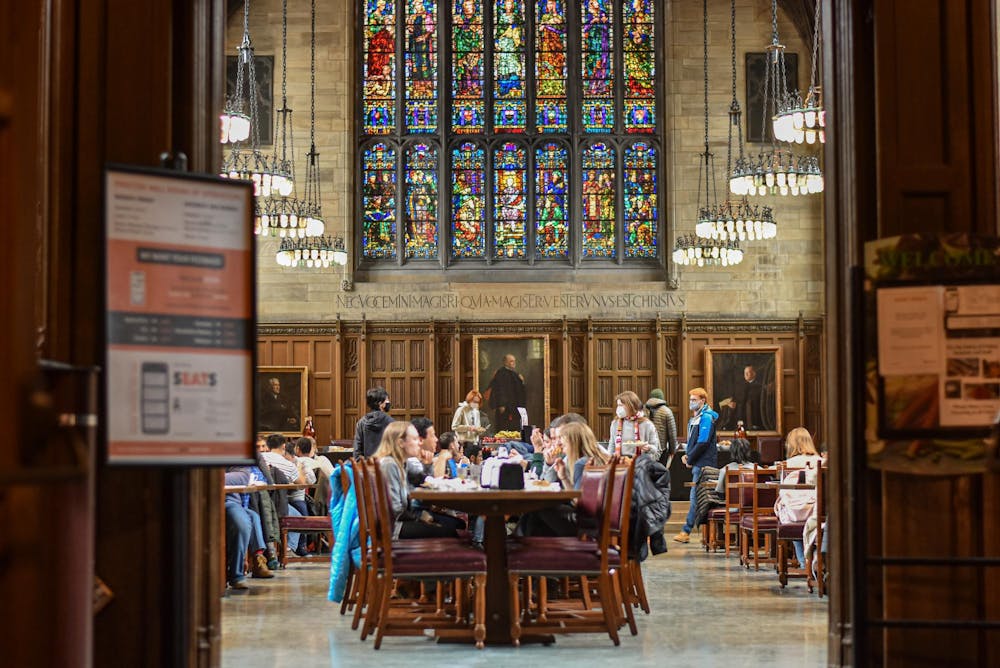In 2023, in the midst of a four-year enrollment expansion, the University commissioned Huron Consulting Group to assess its dining and housing plans and offer recommendations on how they could be improved.
Nearly two years later, the University has announced its most significant shift to campus dining in years: beginning next fall, juniors and seniors living on-campus would be required to purchase a meal plan, effectively eliminating “independent” status. The University will also eliminate independent room draw, which previously gave independent students priority access to kitchen-equipped dorms like Spelman Hall. Despite significant backlash from students, administrators have pointed to Huron’s report, along with other studies conducted over the past decade, as justification for the change.
The Huron report’s research included a survey of 1,546 students in December 2023, a survey of 2,220 recent alumni in January 2024, and an additional survey of 332 sophomores and juniors in February 2024. The consulting group found that the main factor motivating students to choose a particular dining plan is socialization. Student respondents cited gathering spaces, including communal kitchens and private dining rooms, as important elements in forging connections with others.
Among its findings, the Huron report hinted at the University’s eventual meal plan requirement and elimination of independent dining.
“The absence of a required meal plan for residential students and an option to select independent status, unique among Princeton’s peers, has led to some students feeling isolated due to the inability to engage with others during shared meals,” the report wrote.
Over 70 percent of survey respondents said that their dining experience somewhat or significantly increased their sense of belonging and inclusion. However, Black students and those with dining accommodation needs were less likely to report feeling an improved sense of belonging and inclusion.
In an open-ended response about dining belonging and inclusion, one student with a gluten allergy said, “I frequently had to leave a dining hall and go to a different one simply because there were not many options for me to eat.”
When asked what could be improved in the University dining experience, the report shared that many students suggested implementing a partial eating club membership to help alleviate cost concerns, as well as establishing a “late meal” option in the dining halls to help mitigate overcrowding.

Another popular student suggestion in the report was instituting a “meal exchange” option that would allow crossovers between multiple dining plans, including eating club, co-op, and independent students. The report did not mention the fact that meal exchange already exists between students on University dining and eating club plans — although the current plan does not include independents or co-op members.
The Huron report stated that those on the independent plan were least likely to be satisfied with their dining option due to the lack of options to interact with others on dining plans, but did not release a specific statistic. However, the Class of 2025 Senior Survey conducted by the Daily Princetonian found that 73 percent of independent students were satisfied with their dining plan, 60 percent of students on a partial University dining plan were satisfied, and 72.7 percent on the University’s unlimited meal plan were satisfied.
The report also tracked student satisfaction with campus housing. First-year and sophomore students reported higher levels of inclusion in housing experiences than upperclass students, with juniors being the most likely to report that housing does not improve their sense of belonging and satisfaction. The report attributed this “junior dip” to a shift in administrative support and increased difficulty in navigating the dining and housing processes.
Across class years, students consistently expressed a need for increased clarification on housing and dining options. Students reported that their primary source for gathering information on housing and dining options was friends, family, and alumni, often resulting in misinformation and confusion about options available to them.

The report claimed that the difficulty of finding information led to a number of international and first-generation students having little-to-no understanding of their choices.
The Huron report also analyzed the residential systems of peer schools — Harvard, Yale, UChicago, Vanderbilt, Duke, Stanford, and Rice — in order to benchmark Princeton’s progress. It noted that the other schools all required meal plans for students living on campus.
“Princeton’s housing selection process is notably complex compared to many of its peers and takes significantly longer for students to complete the process,” the report asserted, adding that some of the University’s peers also place a greater emphasis on upperclassmen.
The report concluded with multiple recommendations for improvement, focusing on the transparency and organization of housing and dining selections, greater cleanliness of facilities, and increased student ownership of kitchens and other communal spaces.
While the report suggested increased flexibility in the dining system, pointing to possibilities for tiered meal plan options, it also proposed that all students residing on campus join a meal plan. A dedicated dining hall for juniors and seniors was additionally proposed.
In an open-ended response section of the Huron Report alumni survey, alumni discussed the importance of empowering students to make choices that influence their social landscape and personal experience with residential and dining programs.
“Policies that create mandates within the residential system are viewed as a type of coddling of students,” the consulting group wrote.
Elizabeth Hu is a News contributor for the ‘Prince.’ She is from Houston, Tx. and can be reached at eh9203@princeton.edu.
Hannah Adams is a New contributor writer for the ‘Prince.’ She is from Ambler, Pa. and can be reached at ha7650@princeton.edu.
Please send any corrections to corrections[at]dailyprincetonian.com








